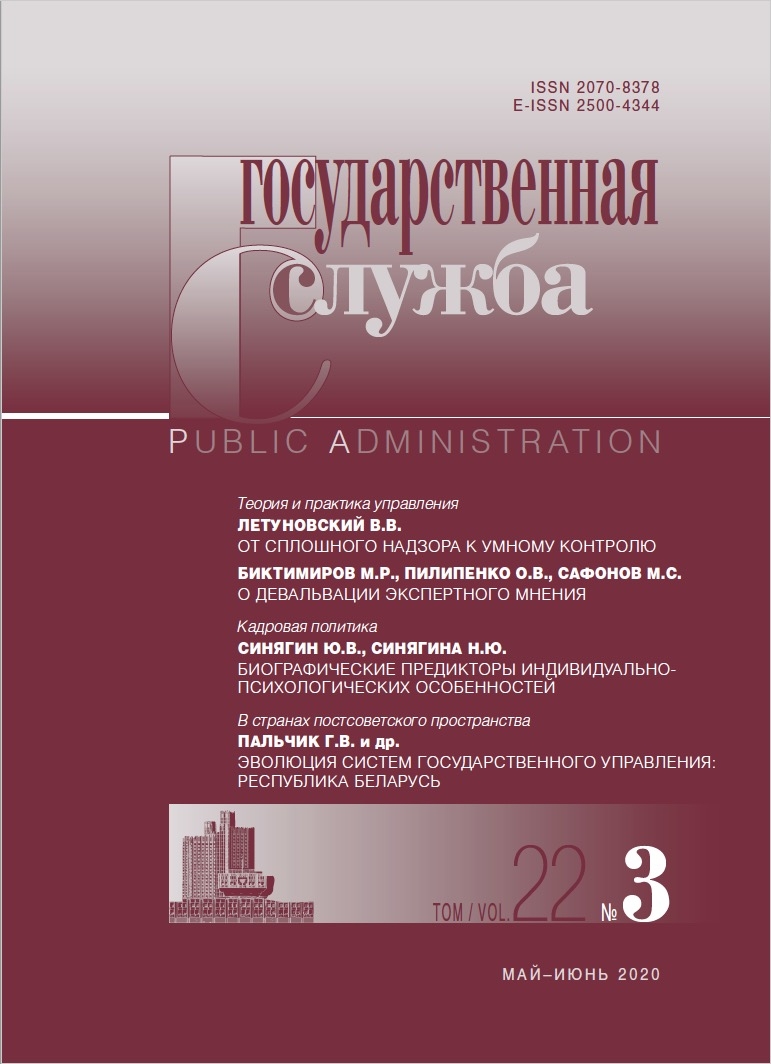Recommended link to article:
YURY V. SINYAGINа
NATALYA Y. SINYAGINAа
аRussian Presidential Academy of National Economy and Public Administration
DOI: 10.22394/2070-8378-2020-22-3-31-47
Abstract:
The article analyzes the role of biographical predictors of individual psychological characteristics that are included in the ‘Big Five’ of personal qualities. The analysis of the relationship of answers to psychobiographical questions included in the questionnaire of management potential (Y.V. Sinyagin, 2014) with the results of the ‘Big Five’ model is presented. The necessity of studying personality traits conducive to successful activities is substantiated. On the basis of empirical research, predictors of managerial success are characterized. Arguments are given for including data containing biographical information in methods of psychological analysis of a person. The authors show that the obtained empirical data can find their practical application in several areas. First of all, it is their direct use during interviews and interviews with leaders.
Keywords:
biographical predictors, ‘Big Five’ individual psychological characteristics of a person, personal qualities, civil servants, leaders
Received:
May 23, 2020
References:
Antonakis J.,DayD.V., SchynsB. Leadership and individual differences: At the cusp of a renaissance. The Leadership Quarterly. 2012. No. 23(4). P. 643–650.
Аvolio B.J. Promoting more integrative strategies for leadership theory-building. American Psychologist. 2007. No. 62(1). P. 25–33.
Barling J., Christie A., Hoption C. Leadership. Zedeck S., ed. APA handbook of industrial and organizational psychology. Vol. 1. Washington, DC: American Psychological Association, 2010. P. 183–240.
Basimov M. M. Five-factor personality model from the perspective of nonlinear psychology. Vestnik Kurganskogo universiteta. 2015. No. 2. P. 30–39. In Russian
Black S.E., Grönqvist E., Öckert B. Born to Lead? The Effect of Birth Order on Non-Cognitive Abilities. NBER Working Paper. May 2017. No. 23393: https://www.nber.org/papers/w23393
Derue D.S., Craig J., Wellman E., Humphrey S.E. Trait and behavioral theories of leadership: An integration and meta-analytic test of their relative validity. Personnel Psychology. 2011. No. 64(1). P. 7–52.
Eckstein D., Aycock K.J., Sperber M.A., McDonald J., Van Wiesner III V., Watts R.E., Ginsburg P. A review of 200 birth-order studies: Lifestyle characteristics. Journal of individual psychology. 2010. Vol. 66(4). P. 408–434.
Frager R., Fadiman J. Personality & Personal Growth. 5th ed. Upper Saddle River, N.J.: Prentice Hall, 2002.
Hernandez M., Eberly M.B., Avolio B.J., Johnson M.D. The loci and mechanisms of leadership: Exploring a more comprehensive view of leadership theory. The Leadership Quarterly. 2011. No. 22(6). P. 1165–1185.
Khromov A.B. Pyatifaktornyi oprosnik lichnosti. Uchebno-metodicheskoe posobie [Five-factor personality questionnaire. Teaching aid]. Kurgan: KSU, 2000. 23 p. In Russian
Luhmann M., Hofmann W., Eid M., Lucas R.E. Subjective well-being and adaptation to life events: A meta-analysis. Journal of Personality and Social Psychology. 2012. No. 102(3). P. 592–615.
Mutuku C. A Psychobiography of Hillary Clinton. Project Report, 2018. ISBN (eBook) 9783668748781: https://m.grin.com/ document/432465
Norman W.T. Toward an adequate taxonomy of personality attributes: Replicated factor structure in peer nomination personality ratings. Journal of Abnormal and Social Psychology. 1993. No. 66. P. 574—583.
Orel V.E., Senin I.G. Lichnostnyi oprosnik NEO PI-R. Rukovodstvo po primeneniyu [Personal Questionnaire NEO PI-R. Application Guide]. SPC ‘Psychodiagnostica’, 2006. 34 p. In Russian
Orth U. The family environment in early childhood has a long-term effect on self-esteem: A longitudinal study from birth to age 27 years. Journal of Personality and Social Psychology. 2018. No. 114(4). P. 637–655.
Sinyagin Y.V. Oprosnik otsenki upravlencheskogo potentsiala v kompleksnoi lichnostno-professional’noi diagnostike [Questionnaire for assessing managerial potential in a comprehensive personal-professional diagnosis]. M.: ‘Delo’, 2020. (In print). In Russian
Tannenbaum S. A strategic view of organizational training and learning. Kraiger K., ed. Creating, implementing, and managing effective training and development. Jossey-Bass, 2002. P. 10–52.
Articles in Open Access mode are published under the Creative Commons Attribution 4.0 International (CC BY) license.

